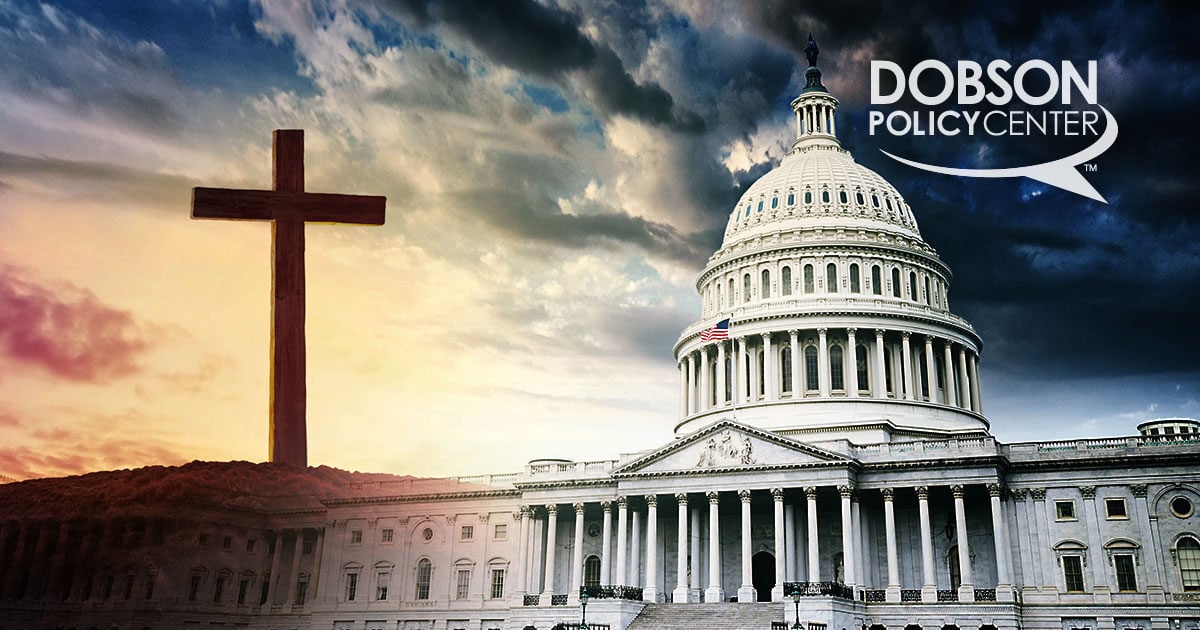Our nation is literally freefalling from a collapse of moral discernment. We have removed God from our public squares and schools, and evil has taken a stronghold. Lord help us if we don't do all we can to protect our children—including the unborn.
When Roe Goes — by Gary Bauer
After Roe v. Wade legalized abortion-on-demand in all 50 states in 1973, pro-life advocates and legislators looked for ways to limit the destruction of innocent life that would pass muster with the court. Here is a brief timeline of the Supreme Court's major abortion decisions after Roe v. Wade:
- Congress enacted the Hyde Amendment in 1976 banning federal funding for abortion. In 1980, the Supreme Court upheld the Hyde Amendment, ruling that Roe v. Wade did not confer "a constitutional entitlement to financial resources."
- In 1986, Missouri passed a law mimicking the Hyde Amendment in that it prohibited state employees from performing abortions and it prohibited state facilities from being used in abortions. The Supreme Court upheld the Missouri law in 1989.
- Pennsylvania passed several abortion restrictions in 1989, such as informed consent, a 24-hour waiting and parental consent for minor girls seeking abortions. Those restrictions were challenged in the courts and reached the Supreme Court in 1992. In Planned Parenthood v. Casey, the Supreme Court upheld most of the Pennsylvania restrictions, but the majority opinion also reaffirmed Roe v. Wade in the process, and imposed a new "undue burden" standard that controlled how states could regulate abortion going forward.
- In Stenberg v. Carhart in 2000, the Supreme Court struck down Nebraska's ban on a gruesome late-term procedure known as "partial-birth abortion," citing the "undue burden" standard established in the Casey opinion.
- Seven years later in Gonzales v. Carhart, after Justice Samuel Alito replaced Sandra Day O'Connor, the Supreme Court effectively overturned the Stenberg decision when it upheld a federal ban on partial-birth abortions enacted by Congress and signed into law by President George W. Bush.
- In 2013 and 2014, Texas and Louisiana passed laws imposing regulations on abortionists and abortion clinics. In 2016, the Supreme Court struck down the Texas regulations in Whole Woman's Health v. Hellerstedt, again citing the Casey decision's "undue burden" standard. In 2020, the Supreme Court struck down the Louisiana regulations in June Medical Services vs. Russo.
- In 2018, Mississippi legislators passed legislation protecting preborn babies after 15 weeks of pregnancy. Several states had passed similar laws banning late-term abortions performed after 20 weeks, and some passed the so-called "heartbeat bill" that prevents abortions performed after six weeks.
- On December 1, 2021, the Supreme Court heard oral arguments in Dobbs v. Jackson Women's Health Organization, challenging Mississippi's 15-week law. A decision is expected in June of 2022.
On the night of May 2, 2022, Politico leaked a draft opinion in the Dobbs case. Written by Justice Samuel Alito, the draft opinion indicated that at least five justices of the Supreme Court — Alito, Barrett, Gorsuch, Kavanaugh and Thomas — are prepared to overturn Roe v. Wade and Planned Parenthood v. Casey. The leak of a Supreme Court opinion is unprecedented in modern history. It hasn't happened since the Roe v. Wade decision was leaked nearly 50 years ago.
Whether the Alito draft survives in whole or in part as the Supreme Court's final decision in the Dobbs case, it seems clear that a majority of justices are prepared to uphold the Mississippi law and permit much greater state regulation of abortion, regardless of whether Roe v. Wade is overturned or not.
Indeed, Chief Justice John Roberts, who may not be prepared to overturn Roe v. Wade, nevertheless indicated during oral arguments that a 15-week prohibition on abortion is "the standard that the vast majority of other countries have."
Left-Wing Lies
But the Politico leak regarding the imminent end of Roe v. Wade caused left-wing politicians and radical pro-abortion groups, along with their liberal media allies, to erupt in a furious rage. Hollywood celebrities and cable news pundits made predictions about the Supreme Court "threatening democracy," conservatives waging a "war on women," and plots to overturn other rights.
Speaker Nancy Pelosi said the Supreme Court was "dangerous" to freedom. National Public Radio compared the pro-life movement to "Christian supremacism, male supremacism, and white supremacy."
One California congressman suggested that if the Alito draft opinion stood, then interracial marriage would soon be banned. Others predicted that contraception would be banned.
These are all disgusting fearmongering, demagoguery, and blatant lies.
Justice Alito evidently anticipated the Left's absurdity. He specifically wrote, "Nothing in this opinion should be understood to cast doubt on precedents that do not concern abortion." And far from being an "extreme right-wing attack on women," the Alito opinion is a well-reasoned compromise.
A Constitutional Compromise
Roe v. Wade was a radical, one-size-fits-all approach to the abortion issue dictated by unelected judges that instantly changed every abortion law in all 50 states. Moreover, pro-abortion advocates continue to make additional demands, such as taxpayer-funding of abortion, and that Christian doctors and hospitals should be required to perform abortions.
The pro-life side believes that preborn babies should be considered full persons under the 14th Amendment of the Constitution and protected by the law.
The draft Alito opinion takes neither side. While declaring that Roe v. Wade is bad law and bad precedent, it does not go so far as to declare a constitutional right to life under the 14th Amendment.
The result is that draft opinion as written returns the issue to the people, allowing the voters and their elected representatives in the states to decide the issue in ways that reflect the values of each state.
That means liberal states like California and New York will still permit abortion, while conservative states like Mississippi and Texas will restrict abortion.
Far from being an "attack on democracy," this position actually encourages more debate and discussion on a serious, life-and-death issue. That should be celebrated in a free society, not denounced with hysterical rhetoric.
Pro-Life Is Pro-Science
For many years, the pro-abortion movement dehumanized the preborn baby. Abortion wasn't taking a life. "It's just a clump of cells, a blob of tissue," they claimed.
In 1973, medical science wasn't nearly as advanced as it is today. In the Roe v. Wade case, the Supreme Court dodged the issue of life. Justice Harry Blackmun wrote in the majority opinion, "We need not resolve the difficult question of when life begins."
But it's not a difficult question today. Every biology textbook tells us that life begins at conception. At that moment, all the DNA is present to determine everything about a person, from their gender to the color of their eyes and hair.
Fifty years later, we now know even more thanks to advances in medical science.
Ultrasound machines and sonograms have given us a window into the womb. We can see the humanity of the preborn baby at every stage of pregnancy. Doctors now perform surgeries on babies in utero when necessary to save or improve the life of that baby. Yes, it is a human life.
We also know that a baby's heart begins beating around week four. Brain activity can be detected around six weeks.
At eight weeks, 90% of the baby's body, including her eyes, are formed. At 12 weeks, the preborn baby can feel pain, and she recoils to avoid the abortionist's knife.
Fact & Fiction
As the debate over abortion plays out in the days and weeks ahead, it's vital that the American people be able to separate fact and fiction.
FACT: The pro-abortion movement in America is rooted in racism.
The founder of Planned Parenthood, Margaret Sanger, was a racist and an advocate of eugenics. Sadly, as Rep. Burgess Owens recently noted, the abortion industry still continues to target minority communities.
FICTION: Abortion is about liberating women, freeing them from oppressive male patriarchy, especially for women with little options and choices.
Abortion, and the claim that it is "health care," treats pregnancy like a disease. It treats the preborn baby like a virus — something to be fought and destroyed.
But bringing life into the world is something only a woman can do. (Sorry, men do not get pregnant!) Abortion does not free women. It allows women to be exploited by selfish men. It denies the most natural and unique ability of women. It is a dehumanizing experience that betrays all motherly instincts.
And being "pro-choice" or choosing death, is not something to be celebrated. There is always a better choice than destroying an innocent life. There are thousands of pregnancy resource centers across the country, filled with loving and caring volunteers who are eager to support women in need.
FACT: There is no constitutional right to abortion. It's just not there.
There is a right to free speech, a right to religious liberty, a right to own a firearm. But there is no right anywhere in the Constitution to kill a preborn baby. Even liberal icon Ruth Bader Ginsburg recognized that Roe v. Wade was bad law and bad precedent.
Ultimately, Roe's survival should be determined by its constitutional merits, and many liberal legal scholars have criticized Roe v. Wade as "arbitrary," "faintly ridiculous," "indefensible" and "constitutional origami."
FICTION: Roe v. Wade is popular — the American people don't want it overturned.
While some polling suggests Americans don't want Roe v. Wade struck down, pollsters usually don't explain the sweeping extent of the decision or why Ginsburg felt it was too radical in some ways.
For example, liberal comedian Bill Maher recently told his audience that he did not realize America's abortion laws were so extreme. He said:
"The modern countries of Europe, [are] way more restrictive than we are. . . If you are pro-choice, you would like it a lot less in Germany and Italy and France and Spain and Switzerland. . . So, for the people who say, 'We're going back to 1973,' we're not. That's just factually inaccurate."
FACT: There is no pro-abortion majority in America. In fact, it's the opposite. Large majorities of Americans want abortion restricted.
According to the Gallup Organization, 67% of Americans say abortions should either be illegal or legal only under certain circumstances, like rape, incest, and when there's a threat to the mother's life.
A January Marist poll found that only 17% of Americans support abortion on demand at any point in pregnancy, and 71% would ban abortions after the first trimester (after 12 weeks). The Marist poll also found that:
- 75% oppose forcing doctors and nurses with religious objections to participate in abortions.
- 73% oppose subsidizing abortions performed in other countries.
- 54% oppose taxpayer-subsidies for abortion.
A May Rasmussen poll found that 67% of Americans believe abortion should be banned after the first trimester, and only 13% believe abortion should be allowed up to the moment of birth.
In other words, the more people understand what Roe permits and the way liberal judges have interpreted it, the less they like it.
The real extremists in the abortion debate are the pro-abortion politicians, radical activists and their media allies who support abortion on demand at any time and for any reason, who claim that "men" can have abortions, and who insist that you pay for them.
–Gary Bauer, used with permission https://www.ouramericanvalues.org/











